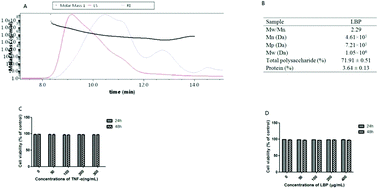Impairment of the intestinal barrier often occurs in inflammatory bowel diseases, and pro-inflammatory factors play a vital role in the pathogenesis of intestinal diseases. In our study, the potential protective effects of Lycium barbarum polysaccharides (LBP) against intestinal barrier dysfunction evoked by pro-inflammatory factors and its anti-inflammatory effects were investigated. Caco-2 cells were stimulated with or without tumor necrosis factor (TNF)-α in the presence or absence of LBP. Our findings showed that LBP assuaged the increase of paracellular permeability and the decrease of transepithelial electrical resistance (TER) in Caco-2 cells. In addition, LBP also prevented the secretion of pro-inflammatory markers (IL-8, IL-6, ICAM-1 and MCP-1) in TNF-α-challenged Caco-2 cells. Moreover, LBP inhibited the overexpression of tight junction (TJ) proteins (claudin-1, ZO-3, and occludin) and the increase of MLCK, pMLC, p-IκBα and NFκBp65 protein expression evoked by TNF-α was suppressed by LBP pre-incubation. This finding indicated that LBP improve TNF-α-evoked intestinal barrier dysfunction via suppressing the MLCK-MLC signaling pathway mediated by NFκB.

